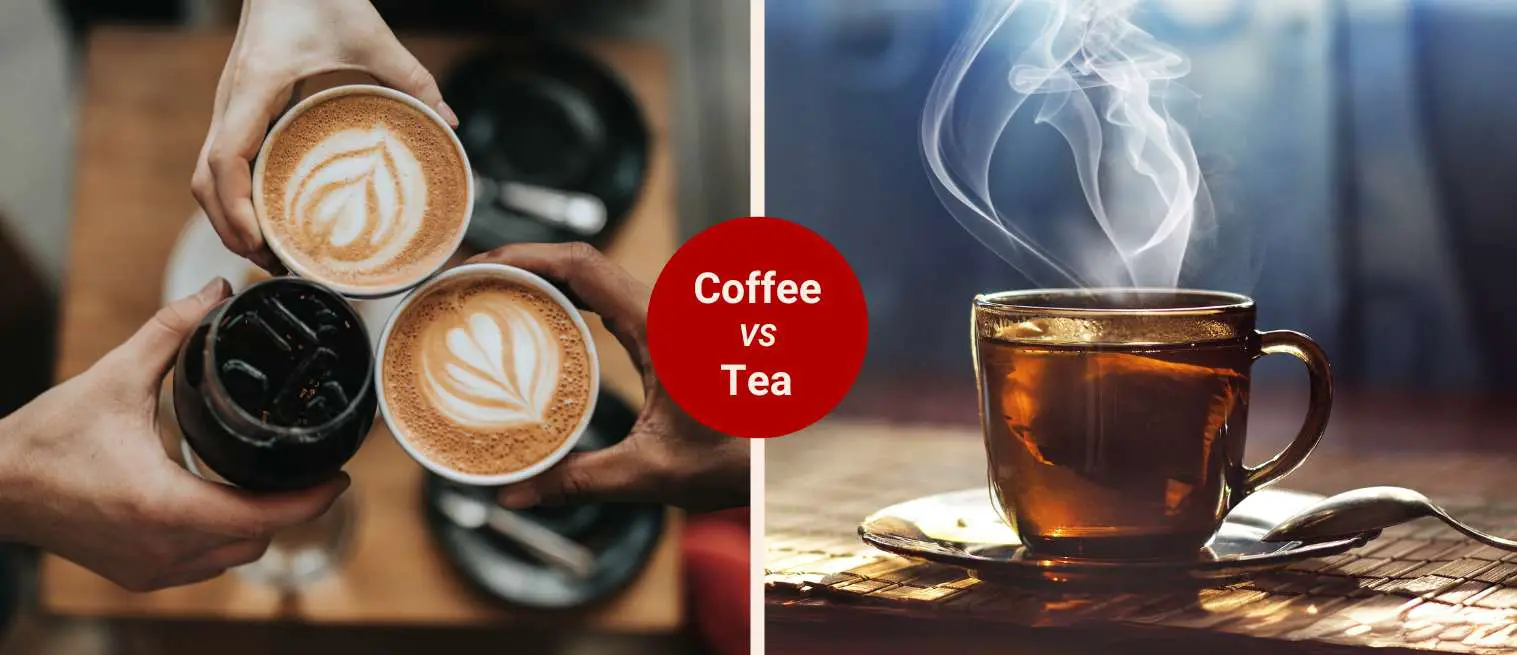Coffee vs Tea: Which One Is Healthier to Drink?
Did you know that over 2 billion cups of coffee and 3 billion cups of tea are consumed every single day? That’s a lot of caffeine choices being made worldwide.
For as long as I can remember, I’ve had this playful back-and-forth with my tea-loving friends. They swear by the calm focus of a good green tea, while I argue nothing beats the instant kick of a strong espresso.
The truth? Neither of us has ever really “won” that debate. I’d say it just keeps brewing.
The problem is, most people don’t know how coffee and tea stack up against each other when it comes to health, energy, and lifestyle. So, instead of arguing, I decided to dive deep into the facts.
In this guide, we’re going to break down Coffee vs Tea from their health benefits and downsides, to how they fit into your daily routine.
By the end, you’ll know exactly which drink works best for your body, your lifestyle, and maybe even your personality. So let’s start brewing!
Coffee vs Tea: Quick Nutritional Breakdown
When you put coffee and tea side by side, their nutrition profiles might surprise you. Both are simple, low-calorie drinks but pack very different benefits in each cup.
| Nutrient/Compound | Coffee | Tea |
|---|---|---|
| Calories (per 8 oz, plain) | ~2 calories (black, no sugar/milk) | ~2 calories (plain brewed, no sugar/milk) |
| Caffeine (per 8 oz) | Espresso: ~63 mg per 1 oz shotDrip coffee: ~95 mgDecaf: ~2–5 mg | Black tea: ~47 mgGreen tea: ~30–50 mgHerbal tea: 0 mg |
| Antioxidants & Polyphenols | Rich in chlorogenic acids and flavonoids; linked to reduced risk of diabetes, liver disease, and some cancers | Contains catechins (esp. EGCG in green tea), theaflavins, and thearubigins; linked to heart health, anti-cancer, and longevity benefits |
| Other Key Compounds | Chlorogenic acid (supports metabolism, may aid weight management) | L-theanine (promotes calm alertness when combined with caffeine) |
Notes:
- Both coffee and tea are virtually calorie-free when consumed plain. The trouble usually starts when sugar, cream, or flavored syrups are added.
- Coffee delivers a quick, strong caffeine hit, which is great for mornings or workouts, but it can also trigger jitters if you’re sensitive. Meanwhile, tea has less caffeine, but the L-theanine helps balance it out, giving you a calmer energy lift.
- Antioxidants differ: coffee’s chlorogenic acids play a big role in blood sugar and fat metabolism, while tea’s catechins (like EGCG in green tea) are studied for their cancer-fighting and heart-protective properties.
- Fun fact: brewing time and method matter. A strong French press coffee will have more antioxidants than a quick drip, just like steeping green tea longer pulls out more catechins.
So, nutritionally speaking, neither drink is “better.” They simply shine in different areas. It really depends whether you need an instant caffeine kick (coffee) or a gentler, steady alertness (tea). But keep reading if you want to learn more details about this debate.
Health Benefits of Coffee
Coffee is more than that caffeine kick. When you start looking at the science, coffee’s packed with health perks that go way beyond keeping your eyes open during an early meeting.
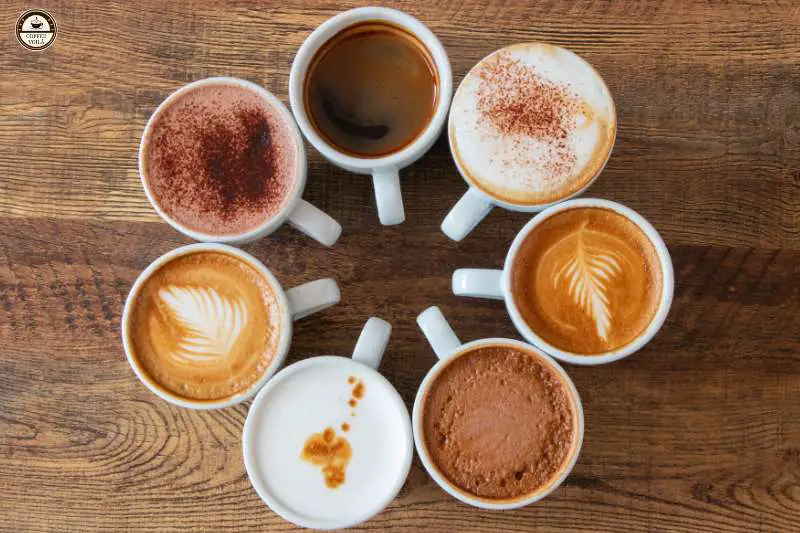
Boosted Alertness, Energy and Focus
Caffeine blocks adenosine, the brain chemical that makes you feel tired, and boosts dopamine so you feel more alert and focused. The flip side, of course, is overdoing it and ending up jittery.
Lower Your Risk of Type 2 Diabetes
Research shows coffee’s chlorogenic acids help improve insulin sensitivity, and several large reviews link regular coffee drinking with a significantly lower diabetes risk. That blew my mind a bit, considering how often coffee gets labeled as “unhealthy.”
Antioxidant Power
Coffee is one of the biggest sources of antioxidants in the modern diet more than fruits for some people. These antioxidants, especially chlorogenic acids, fight off free radicals and reduce inflammation.
Heart and Brain Health
Regular coffee drinkers have a lower risk of stroke, dementia, and even Alzheimer’s. The reason is that antioxidants protect blood vessels and keep circulation healthy. For instance, I notice when I drink coffee consistently (but not excessively), my brain feels sharper throughout the day.
Coffee Can Improve Performance
Back when I was training with weights a few times a week, I started experimenting with a quick shot of espresso about 30 minutes before hitting the gym.
It wasn’t anything fancy, just a straight, strong espresso. The boost was almost immediate. I felt sharper, my energy kicked in faster, and I noticed I could grind out those heavy sets without gassing out as quickly.
The fact is, caffeine improves strength, endurance, and even helps your body tap into fat stores during exercise. For me, that tiny cup worked better than most pre-workout powders, and it tasted a whole lot better too.
Notes:
Coffee has many benefits, such as alertness, protection against chronic disease, brain support, and even athletic gains. Just don’t go overboard, or you’ll find yourself learning the hard way what “too much caffeine” feels like. But, keep reading and we’ll dig into the details of this debate.
Health Benefits of Tea
Tea is loaded with benefits that can fit into almost anyone’s daily routine. For instance:
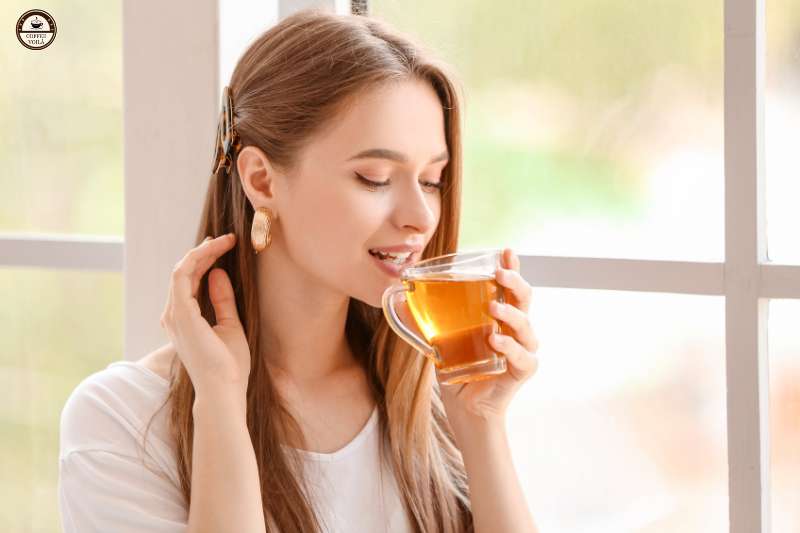
Promotes Calm Alertness (L-theanine + Caffeine Combo)
One of my favorite things about tea is that it keeps you alert without making you feel like you’re bouncing off the walls.
That’s thanks to L-theanine, an amino acid that promotes relaxation while still sharpening your focus. This paired with the moderate caffeine in tea, you get this unique state of “calm alertness.”
Green Tea and Weight Management Benefits
Green tea is rich in catechins, especially EGCG (epigallocatechin gallate), which can slightly boost metabolism and fat oxidation.
Studies even show that regular green tea drinkers may burn an extra 70–100 calories a day. It’s subtle, but when paired with exercise and better eating, it adds up.
Black Tea and Heart Health
Black tea doesn’t always get the spotlight, but it should. It contains theaflavins and thearubigins, which have been linked to improved cholesterol levels and reduced risk of stroke.
I remember reading a study that showed people drinking 4+ cups of black tea daily had a significantly lower risk of stroke compared to non-drinkers.
Herbal Teas for Digestion, Sleep, and Relaxation
Not all tea contains caffeine. For instance, herbal teas like chamomile, peppermint, and rooibos come with their own unique health perks.
Chamomile is often used to improve sleep, peppermint is great for soothing digestion, and rooibos is naturally rich in antioxidants. They’re also perfect evening choices, especially chamomile, which can calm your mind and even curb late-night snacking.
Lower Caffeine Content = Gentler on the Body
Finally, one of the biggest advantages tea has over coffee is that it’s gentler on the body. With black tea averaging around 47 mg of caffeine per cup (compared to about 95 mg in coffee), it’s less likely to cause jitters, anxiety, or sleep problems.
If you’re caffeine-sensitive, tea can give you that boost without the rollercoaster effect.
Notes: Tea promotes calm alertness, supports heart and weight health, and offers herbal options for sleep and digestion. And all with less caffeine than coffee, making it gentler on the body.
Coffee: Potential Downsides
We’ve already touched on a few health perks of coffee, but it’s only fair to look at the flip side too. As much as I love my morning brew, there have been times when I realized it wasn’t doing me any favors. So, let’s talk about some common downsides:
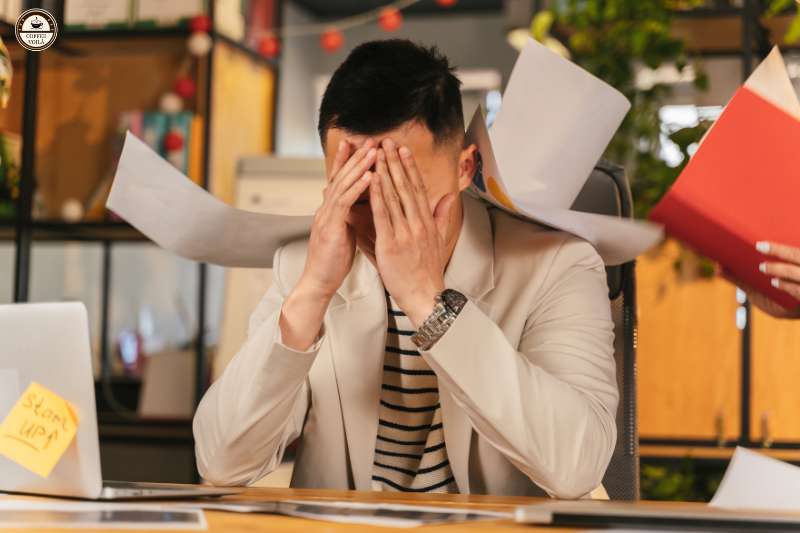
Can cause jitters, anxiety, or restlessness
That “wired” feeling from too much coffee comes from caffeine spiking dopamine and blocking adenosine, which normally tells your body it’s time to rest.
If you’re prone to anxiety, high amounts can make it worse. A good workaround is switching to half-caf or decaf in the afternoon. This way, you still enjoy your coffee habit without the overwhelming buzz.
May disrupt sleep
Coffee sticks around in your system a lot longer than you think. For example, caffeine has a half-life of about 5 hours. In other words, that 3 p.m. latte might still be keeping you awake at 10.
For this reason, if sleep is a struggle, try cutting yourself off by early afternoon. You can also switch to herbal tea, which can be a gentler evening swap.
Can irritate the stomach or cause acid reflux
The fact is, drinking coffee on an empty stomach can be a bad idea. The acidity can trigger heartburn or leave you with that uncomfortable sour feeling.
Meanwhile, cold brew tends to be smoother and less acidic. So that can be a good option if you want to avoid stomach issues.
Risk of dependency with high caffeine intake
Caffeine withdrawal is real, and it’s no fun. The safe limit for most people is around 400 mg per day (roughly 4 cups of brewed coffee), though it can be less if you’re sensitive.
A good idea is to take a few days off or mix in tea, which is a simple way to reset your tolerance and keep your coffee habit in check.
Notes: Too much coffee can cause jitters, anxiety, or sleep problems, and its acidity may upset the stomach. Plus, high caffeine intake can also lead to dependency. For this reason, moderating with decaf or tea helps keep things balanced.
Potential Downsides of Tea
We’ve already talked about the good stuff, but tea isn’t all smooth sailing. There are a few drawbacks worth keeping in mind, especially if you drink it daily.
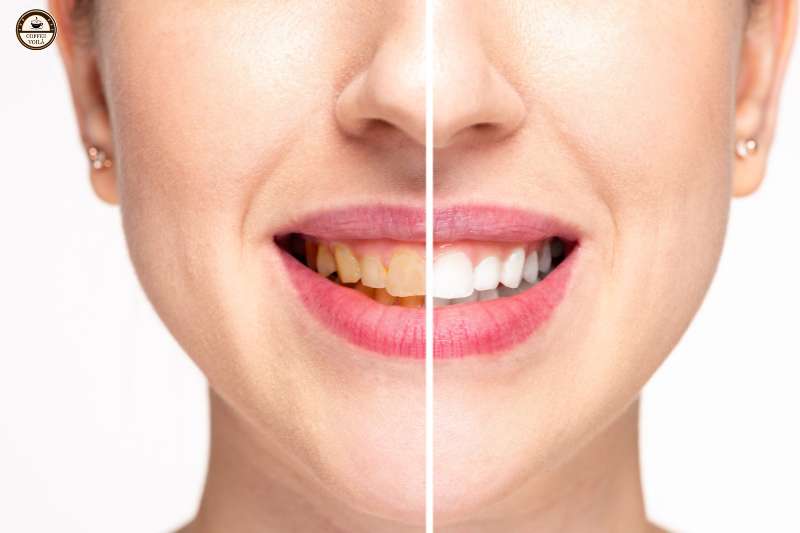
May stain teeth over time (black tea especially)
One of the more annoying things about black tea is how it can leave behind stains on your teeth. It’s not harmful, but it doesn’t look great either.
If you’re a heavy tea drinker, brushing soon after or even just rinsing with water can help reduce stains. And for iced tea, sipping through a straw might feel a little silly, but it does make a difference.
Excess caffeine in strong black or green tea may still cause sleep issues
People sometimes assume tea is always “light” compared to coffee. Not quite.
A strong black tea can pack around 60–70 mg of caffeine, which is enough to mess with sleep if you’re sensitive. Even green tea, depending on how long you steep it, can creep up. For this reason, cutting yourself off by late afternoon is usually the safest bet.
Some herbal teas interact with medications
Herbal teas like St. John’s wort or licorice root can interact with prescription medications. If you’re drinking herbal blends daily and taking meds, it’s worth double-checking with a doctor or pharmacist.
Lower iron absorption when consumed with meals
Tea contains tannins, and those compounds can reduce how much iron your body absorbs from food. This mostly matters if you already have low iron or eat a mostly plant-based diet. A simple fix is to enjoy your tea between meals instead of alongside them.
Notes: Tea is healthy but not flawless. For instance, black tea can stain teeth, caffeine in strong brews may still disturb sleep, some herbal teas interact with medications, and tannins can lower iron absorption if you drink it with meals.
Lifestyle Considerations: Which Drink Fits You?
At the end of the day, the choice between coffee and tea isn’t about health facts. Instead, it’s about how each one fits into your daily lifestyle.

Coffee for quick energy boosts and productivity
When you need to power through a heavy workload or shake off morning grogginess, coffee usually wins. Its higher caffeine content delivers that fast jolt of alertness. I’ve found that even a single espresso can feel like flipping a switch in my brain.
Tea for a calmer, longer-lasting alertness
On the other hand, tea doesn’t hit you as hard. Thanks to L-theanine, the energy feels steadier and less of a spike and crash. It’s perfect if you want to focus without the jittery edge that coffee sometimes brings.
Which is better for mornings vs evenings?
Well, coffee shines in the early hours when you’re gearing up for productivity. But drinking it too late? Say goodbye to decent sleep. Tea, especially herbal or green, works beautifully in the afternoon or evening when you want something warm and soothing without risking insomnia.
Which suits people sensitive to caffeine
If you’re prone to jitters or anxiety, tea is usually the safer bet. For instance, herbal teas even give you the comfort of a hot drink with zero caffeine.
Cultural and lifestyle factors in choosing one
Coffee has become tied to hustle culture. In other words, you grab a cup on the way to work, sip it through morning meetings, or lean on it for late-night study sessions.
On the other hand, tea often carries a slower pace, whether it’s a Japanese tea ceremony or a simple chamomile before bed.
Notes: Coffee is best for quick energy and productivity, while tea offers calmer, longer-lasting focus. Often coffee works better in the morning, tea (especially herbal) fits evenings. If you’re caffeine-sensitive, tea is gentler, and culturally coffee leans hustle while tea leans slow ritual.
Last Thoughts
At the end of the day, the whole coffee vs tea debate is about figuring out which drink works best for you.
Now I want to hear from you: are you team coffee, team tea, or happily both? Do you find coffee helps you power through mornings, or does tea give you the steadier focus you need? Maybe you even switch depending on the time of day.
So go below and leave your thoughts in the comments. If you enjoyed this guide, share it with your friends. And with that… voilà!”
Questions? We Have Answers.
Get answers to a list of the most Frequently Asked Questions.

